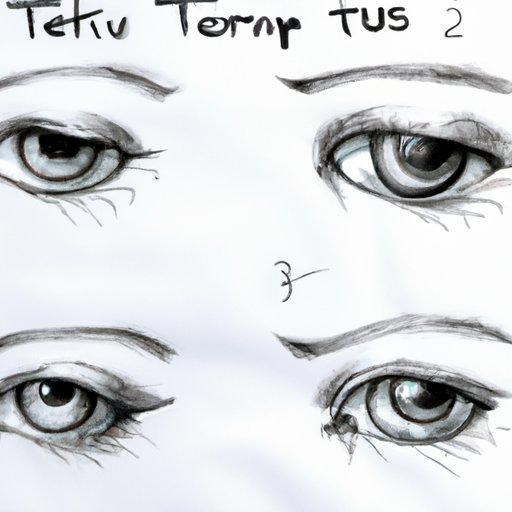
I. Introduction
Are you struggling to draw realistic eyes in your artwork? As one of the most prominent features in a portrait, eyes can make or break the realism of your drawing. In this article, we will provide a step-by-step guide, top tips, common mistakes to avoid, and inspiration for achieving realistic eyes in your drawings.
II. Step-by-Step Guide to Drawing Realistic Eyes
Before diving into details, it’s essential to understand the basic shape of the eye. Start with an almond-shaped outline with a slightly pointed end that evokes the eyes’ natural curvature.
Step 1: Sketching the outline of the eye. Take a pencil and draw the outline.
Step 2: Drawing the iris and pupil. Draw the circular pupil and lightly shade the iris with your preferred color.
Step 3: Adding shading to create depth and dimension. Shade the outer corners of the iris and the inner corners that meet the tear ducts. Add subtle shadows to the upper eyelid and lower lash line.
Step 4: Adding highlights to create a realistic effect. Add a white highlight to the pupil of the eye to create a luminous effect, and work on the reflection of light on the eye to finalize the drawing.
Conclusion and additional tips. Remember to soften edges, blend, and adjust contrast during the drawing process.
III. Top Tips for Achieving Realistic Eyes in Your Drawings
Observation is fundamental in becoming a proficient artist. Observe real eyes and use references for size, shape, and color information. Another tip for achieving realistic eyes is to pay attention to the shape and size of the iris. Use shading and highlights to create authenticity by incorporating texture and depth.
Conclusion and additional tips. Practice makes perfect. Keep experimenting to find the best techniques that work uniquely for you.
IV. Common Mistakes to Avoid When Drawing Realistic Eyes
One common mistake while drawing realistic eyes is over-exaggeration. Eyes should be proportionate to the rest of the face and work seamlessly with other facial features. Neglecting to draw the lower eyelid and improperly shading the iris could also be critical mistakes.
Conclusion and solutions to these mistakes. Always use references to avoid over-exaggerating features, pay attention to the lower eyelid, and accurately shade the iris.
V. The Importance of Lighting in Realistic Eye Drawing
Lighting is crucial in creating a realistic eye drawing. It showcases the reflection of light on various eye surfaces, creating texture and dimension. Learn the basics of lighting and how to incorporate it into your drawings for more realistic-looking eyes.
Conclusion and additional tips. Remember to use a light source and have it interact with the eyes to give them a realistic look.
VI. Drawing Realistic Eyes: Inspiration and Examples
One of the best ways to learn is by observing others’ works. Explore a collection of realistic eye drawings from other artists and see the elements that contribute to the realistic effect. Guidance on incorporating those elements into your drawings is provided.
VII. Conclusion
Recap of the article. Drawing realistic eyes is a challenging task, but with constant experimentation, practice, and patience, it can be mastered. We hope that the guide, tips, and inspiration provided in this article have helped you propel your skills to the next level.
Encouragement to practice and experiment. The best way to learn is by doing. Keep practicing and discovering new techniques.
Final tips and advice for drawing realistic eyes. Keep exploring new techniques, don’t be afraid to take risks, and always remember to use references to improve your skills.





